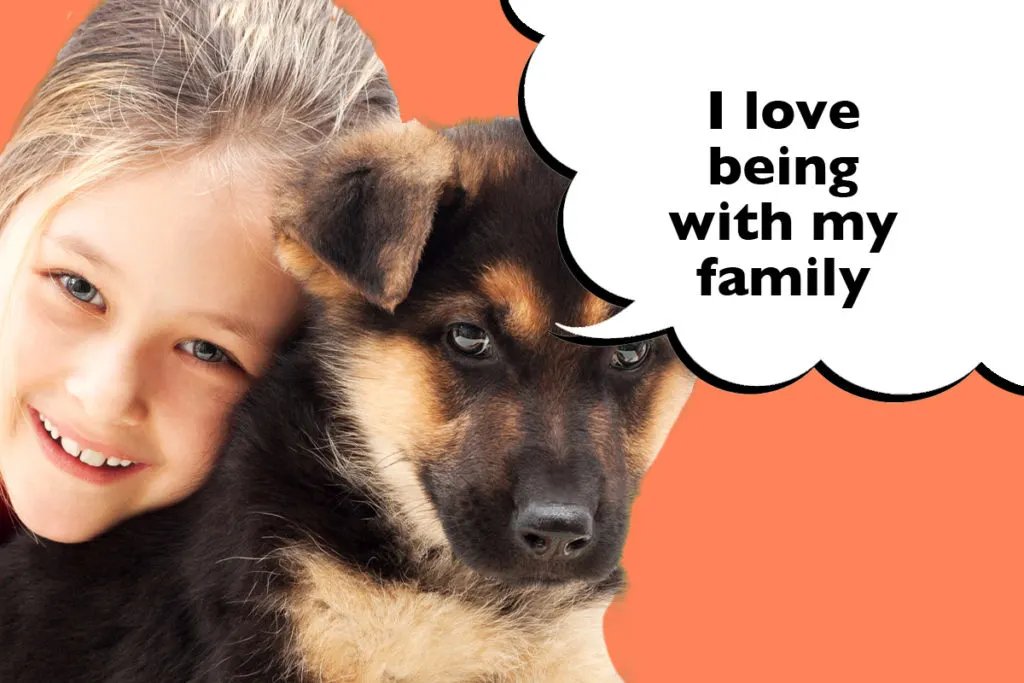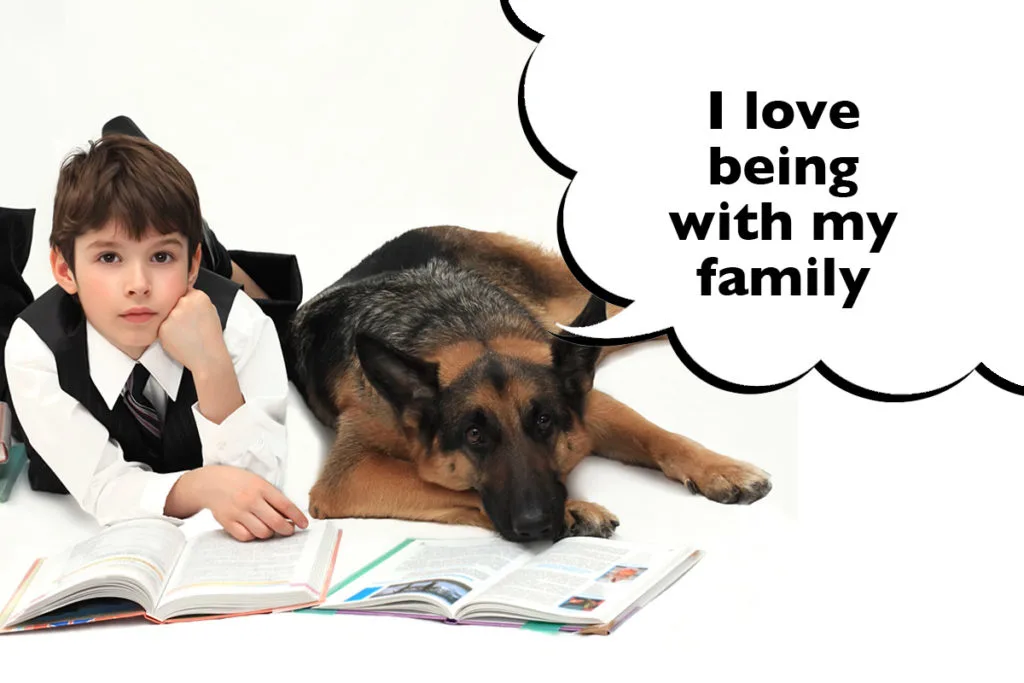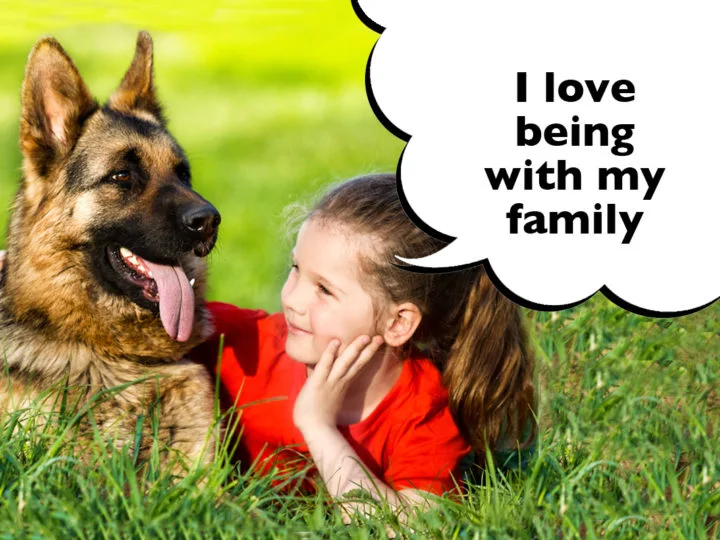Are you thinking of getting a German Shepherd but don’t know if the breed is right for your family? Maybe you have small children or a baby on the way and aren’t sure if they’re the right dog for you? Here’s everything you need to know about whether German Shepherds are good family dogs.
Are German Shepherds Good Family Dogs? Yes, German Shepherds can make great family dogs! They’re a loyal and protective breed that form really strong bonds with the people they live with. However, they can also be over-protective of their families, so do need consistent training and boundaries.
Read on to find out how German Shepherds are around babies, what you can do to prepare them for your new arrival, and what rules the kids need to follow to keep everyone happy at home!
Never use the advice in this article as a substitute for professional veterinary advice or treatment. I am NOT a Vet, qualified dog trainer or dog behaviourist. This article is based on research, personal opinion and experience of owning dogs over the last 12+ years.
Are German Shepherds A Popular Family Dog?
Yes, according to the American Kennel Club, German Shepherds have been the second most popular dog breed in America since 2013. They moved down one spot in 2020 to third place, but they’re clearly still a very popular choice for many families.
A German Shepherd that’s well trained and socialised can make a great member of the family.
Are German Shepherds Good With Babies?
German Shepherds can be very good with babies provided they’re introduced to them correctly. Even though they’re usually patient dogs, you should never leave your German Shepherd alone with a baby. As adults, they’re very big and heavy and could unintentionally hurt a baby.
Puppy German Shepherds can also be very clumsy and bouncy, so could accidentally bump into a baby’s crib or pram.
That’s why it’s so important to never leave a baby unattended with a German Shepherd, or any other type of dog breed.
If you already have a German Shepherd and are expecting a baby, then there are some things you can do to help prepare them for your new baby’s arrival.
This is how to prepare your German Shepherd for your new baby’s arrival:
Introduce Baby Sounds
German Shepherds can be naturally anxious of new or surprising noises. So playing noises that a baby would make like gurgles and crying, can help them get used to things.
Because they’ve heard the sounds previously, it should make them feel less stressed.
Just start by playing the sounds on a low volume and increase it gradually over time.
Set Up Your Baby’s Equipment Early
Set up any equipment such as the crib, car seat, pram and highchairs around your home before your baby actually arrives.
This gives your German Shepherd time to adjust to these new things before the new baby comes home.
Let them smell and explore each object and reward them for remaining calm.

Keep Up Your German Shepherd’s Exercise
Adult German Shepherds need at least 2 hours of exercise each day, as well as time to play and be trained too.
If it’s possible, it’s best to keep up this level of activity for your German Shepherd before and after the new baby arrives.
Getting plenty of daily exercise can help them to stay calmer and feel less frustrated.
Create A Safe Space For Your German Shepherd
It’s important that your German Shepherd has a safe and comfortable place to rest where they won’t get disturbed.
This could be a crate or even a different room where the baby won’t be.
Give them a comfy bed and some toys that they always have access to.
That way your German Shepherd can take themselves off there for a snooze if they feel like they need a break.
Introduce Your German Shepherd To Babies
If you have family or friends with babies, it may be a good idea to introduce your German Shepherd to them.
This can help them get used to the scents, sounds and movements that your own baby might make.
The more experience your German Shepherd has around babies, the easier they’ll find it to adapt to living with your own baby.
However, it’s important to consider your German Shepherds individual personality and past experiences before letting them interact with any babies or children.
They can be naturally wary of new people that are not from their own family, so should always be closely supervised at all times.
Don’t take any risks. If you’re not sure how they’ll react, don’t do it!
Do Enrichment Activities With Your German Shepherd
German Shepherds are really intelligent dogs that need to keep their minds busy.
Activities like snuffle mats, hide and seeking for treats, puzzle toys and food toys are all great ways to keep them entertained.
Enrichment activities like these are also great ways to combat stress. Licking, chewing and sniffing are all naturally calming for your German Shepherd.
This can be really helpful if they’re feeling a bit stressed about being around a new baby.

Are German Shepherds Good With Children?
Yes, German Shepherds can be great with children. But, due to their large size, it’s usually better for them to be around older children, rather than toddlers. They could easily knock over a young child, particularly during the excitable puppy stage!
However, with careful training and boundaries, German Shepherds can happily live alongside kids of any age.
The American Temperament Test Society (ATTS) have been testing the temperaments of different dog breeds since 1977.
The test looks at a dog’s reactions towards strangers, sounds, sights, walking on unusual textures, and if they show any aggressive or protective behaviours.
They tested 3383 German Shepherds and found they got an 85.3% pass rate. This high pass rate suggests that German Shepherds are a stable, dependable breed that can also stay calm when faced with something unpredictable.
This puts them in good stead for being around children, as they too can be unpredictable with their sounds and movements.
However, it’s really important to make sure your German Shepherd is well socialised with children and that they’re well trained too.
German Shepherds that haven’t had proper training can be too boisterous and excitable for some children to handle. This is especially true if the children are not used to being around large, strong dogs.
But, it’s equally as important to make sure that kids know how to behave around your German Shepherd too.
Here are some ground rules that children should follow:
Don’t Climb On Your German Shepherd
Although German Shepherds are big, strong dogs, don’t let children climb or lean on them.
Some German Shepherds are prone to developing issues with their joints, particularly hip dysplasia and Arthritis.
If a child were to lean on their already painful joints, this could really hurt!
Kids should also never be allowed to sit on a German Shepherds back. They might be a tolerant and patient breed, but this should never be encouraged.
Don’t Pull At Your German Shepherd
German Shepherds have a thick coat, bushy tail and soft ears which often stick upright, all of which may be tempting for kids to grab.
This should be discouraged though as it can hurt them, and they might even growl or snap.
Leave Your German Shepherd Alone At Mealtimes
German Shepherds can be protective over their food and treats, so they shouldn’t be disturbed a mealtimes.
It’s best for the whole family to leave them alone when they’re eating.
Don’t Wake Your German Shepherd Up
Although German Shepherds usually have a lot of stamina, they do need to rest and sleep throughout the day too.
When they’re sleeping, they shouldn’t be disturbed or woken up suddenly. This could make them growl or snap at whatever or whoever has disturbed them.
Are German Shepherds Good With Older People?
German Shepherds are a hugely loyal breed who love to form strong bonds with their owners.
Originally bred as guard dogs to watch over livestock, they’re very alert and often bark loudly at the door or if someone’s around.
This can make an older adult feel safer, particularly if they live alone.
However, they do require at least 2 hours of exercise a day, which may be too much for some older people to manage.
They’re also very powerful dogs that can pull hard when being walked on a leash.
This may be overpowering for some older people who could find it difficult to walk them properly.
It may be a good idea for older people to ask a dog walker that’s experienced with large breeds to help with their German Shepherd’s exercise, if they can’t manage it themselves.
So there you have it! German Shepherds are generally gentle giants that do make good family dogs. However, they’re also powerful and can be a bit protective and boisterous which may be a bit much for younger kids or older people to manage. You will need to put boundaries in place and work with them on training.
What do I do next?
Thank you for reading all the way to the end of this article, your support for my blog means everything to me! If you found this article helpful, please kindly share below. Thank you!

